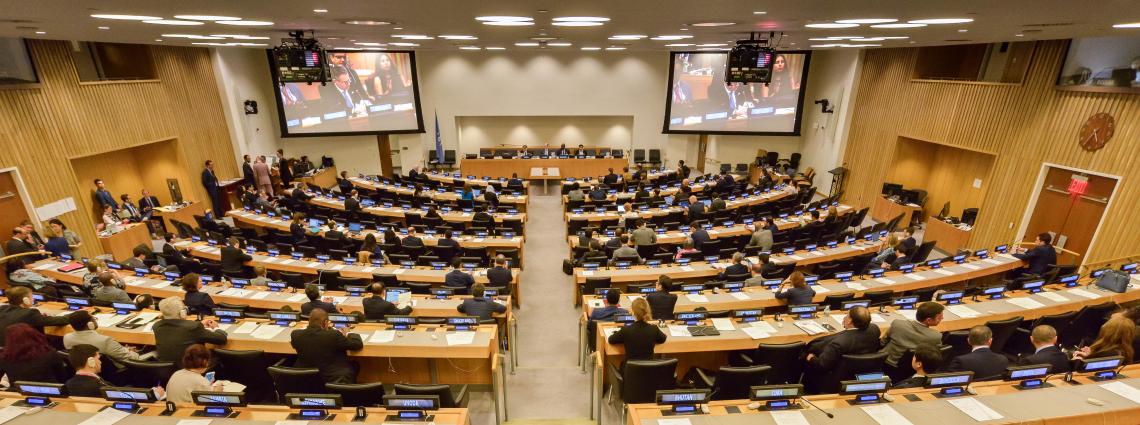Tenth Conference to advance CTBT Entry Into Force held at the United Nations
The tenth Conference on Facilitating the Entry into Force of the Comprehensive Nuclear-Test-Ban Treaty (CTBT) held on 20 September, took place on the margins of the opening of the 72nd session of the United Nations General Assembly at which Heads of State and Government convene in New York. The conference also took place less than three weeks after the sixth nuclear test conducted on 3 September 2017 by the Democratic People’s Republic of Korea (DPRK).
The CTBT contains a special mechanism to promote its entry into force – a conference designed to facilitate this objective which takes place every other year. While its official designation is the Conference on Facilitating Entry into Force of the CTBT, it is more commonly known as the “Article XIV conference” in accordance with the relevant Treaty article.

Tenth Conference on Facilitating the Entry into Force of the Comprehensive Nuclear-Test-Ban Treaty (Article XIV) took place at @United Nations Headquarters in New York.

CTBTO Executive Secretary Lassina Zerbo greets United Nations Secretary-General António Guterres.
A CTBT that is in force would be a milestone on the road to a world free of nuclear weapons. It has the potential to prevent a nuclear arms race and an escalation of regional and bilateral tensions.
The foreign ministers of Japan and Kazakhstan, Foreign Minister Taro Kono and Foreign Minister Kairat Abdrakhmanov, the co-coordinators of the 2015-2017 Article XIV process, presented their remarks at the opening of the conference before passing the Presidency to the new co-coordinators of the 2017-2019 Article XIV process, Belgium and Iraq. Japan and Kazakhstan submitted a progress report of the co-presidency of the Article XIV process from September 2015 to September 2017 to the conference, in which they reaffirmed “their commitment and readiness to work closely with the incoming co-presidents, as well as with other countries to further advocate the noble cause of a comprehensive and global test ban on a nuclear weapon test explosion or any other nuclear explosion”.

United Nations Secretary-General António Guterres delivering his official statement.

Miroslav Laj?ák, President of Seventy-second General Assembly; António Guterres, United Nations Secretary-General and Didier Reynders, Deputy Prime Minister and Minister of Foreign Affairs of Belgium.
Make no mistake: we need this Treaty.

Miroslav Laj?ák of Slovakia, President of Seventy-second General Assembly.

EU High Representative for Foreign Affairs and Security Policy, Federica Mogherini giving her statement on behalf of the European Union.
“The Comprehensive Test-Ban Treaty Organisation responded immediately and effectively to the nuclear tests conducted by the DPRK in 2016 and 2017: it demonstrated the verification regime's ability to provide independent and reliable data. These data play an important role in deterring non-compliance with the Treaty and developing appropriate responses. This is an important contribution to regional and international stability: it helps strengthen the nuclear non-proliferation regime and is essential for verifiable nuclear disarmament. The CTBTO has provided the world with a truly global, hi-tech monitoring system for nuclear explosions – something that no single country alone would be able to do. Nonetheless, the absence of the CTBT’s entry into force prevents the use of on-site inspections, an important verification tool.”
While in New York, Zerbo met with a large number of high-level representatives and conducted a Press Briefing at the UNGA on the sixth nuclear test by the DPRK.

Under-Secretary-General and High Representative for Disarmament Affairs Izumi Nakamitsu.

The Chairperson of the Preparatory Commission for the Comprehensive Nuclear -Test-Ban Treaty Organization, Paulina Maria Franceschi Navarro, Permanent Representative of Panama.

CTBTO Executive Secretary Lassina Zerbo gives a press briefing at the UNGA.
Above all, given the present situation, it would diffuse tensions in ‘nuclear hotspots’ such as the Korean Peninsula. The world needs to calmly and resolutely find a means of de-escalating that crisis. A testing moratorium – at the very least – should be part of that solution.
25 Sep 2017
